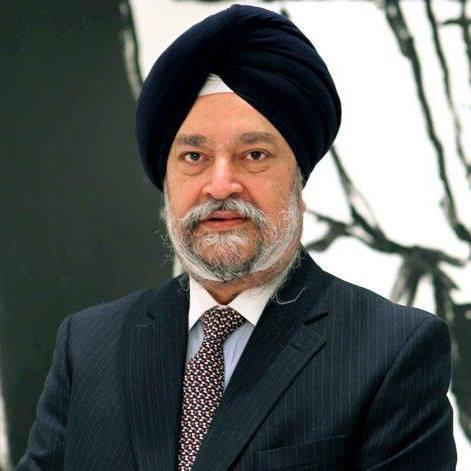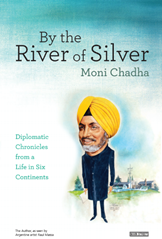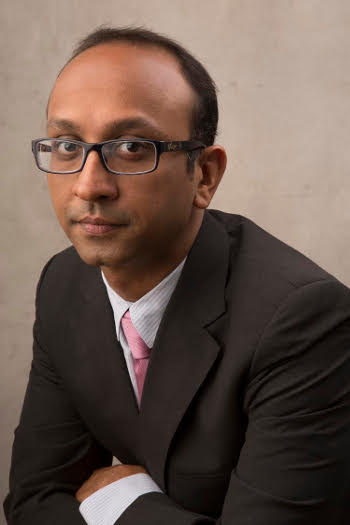|
| |
THIRD ANNUAL IAAC LITERARY FESTIVAL
NYU KIMMEL CENTER, 60 WASHINGTON SQUARE SOUTH, NYC
|
| OCTOBER 7-9, 2016 |
| |
| Sunday October 9, 2016.
5:00 - 6:00 pm |
| |
Session 5A -
Calling the Shots |
 |
| |
Ambassador Hardeep Singh Puri, Moni Chadha in conversation with Vikas Bajaj
Lives representing India in politics and diplomacy, discuss their personal and professional commitments. |
| |
| Ambassador Hardeep Singh Puri |
 Hardeep Singh Puri is a former Indian Foreign Service officer, who has had a distinguished four-decade long career in diplomacy spanning the multilateral arena, including as India’s Permanent Representative to the United Nations in both Geneva (2002-2005) and New York (2009-2013). He is one of the few Indians to preside over the United Nations Security Council and the only one to have chaired its Counter-terrorism Committee. He was also stationed at important diplomatic posts in Brazil, Sri Lanka, Japan and the UK. He most recently served as Vice President at the International Peace Institute and as Secretary-General of the Independent Commission on Multilateralism in New York. Hardeep Singh Puri is a former Indian Foreign Service officer, who has had a distinguished four-decade long career in diplomacy spanning the multilateral arena, including as India’s Permanent Representative to the United Nations in both Geneva (2002-2005) and New York (2009-2013). He is one of the few Indians to preside over the United Nations Security Council and the only one to have chaired its Counter-terrorism Committee. He was also stationed at important diplomatic posts in Brazil, Sri Lanka, Japan and the UK. He most recently served as Vice President at the International Peace Institute and as Secretary-General of the Independent Commission on Multilateralism in New York. |
| |
| Perilous Interventions |
A specter of fear threatens to engulf the so-called civilized world. The forces of evil, chaos, and destruction epitomized by ISIS or Daesh continue their onslaught despite an international military effort against them by the very countries that helped their creation in the first place. Is Daesh just a terrorist force or an ideology?
Perilous Interventions is a timely publication, in which one of India’s most experienced and able diplomats provides a fascinating insider’s account. It takes a clinical and forensic look at the contrived narrative of the Arab Spring and analyses the core decision-making responsible for the prevailing dangerous situation: the use of military force, the arming of rebels, the unraveling of countries, and the resulting desperate migrations. The explosive narration - which revisits not just Libya and Syria, but also Yemen and Ukraine, along with India’s own misadventure in Sri Lanka in the 1980s - unveils the whimsical decision-making behind bids to maintain international peace and security. It warns against the not-so- shrewd arming of rebels and the reflexive authorization of force, instances of which since the Iraq invasion of 2003, have cyclically led to the evolution of hydra-headed monsters like the ISIS.
|
|
| Moni Chadha |
With refreshing candour, the author shares amazing experiences from his life and work in well over a hundred countries, unusual even for a diplomat. His unique insights and anecdotes from his privileged vantage point are an invaluable embellishment to the history of our times.
Moni Chadha’s family was among the millions forced across the Radcliffe Line in 1947, from his ancestral home in Rawalpindi in pre-partition India. In Delhi, he went to Modern School and St. Stephen’s College before joining the Indian Foreign Service in 1960. Much of his life was devoted to multilateral diplomacy, for India and on behalf of the United Nations. |
| |
| By the River of Silver |
 In 1965, the author returned to India after diplomatic assignments in Moscow and Warsaw. By that year, at age 28, he had qualified in an incredible five foreign languages: Russian, German, French, Polish and Spanish, each by the ‘Advanced Standard’ (consecutive interpretation). His exceptional skills were put to excellent use over the years, next as First Secretary at the Indian Mission to the United Nations in New York in 1968. In 1965, the author returned to India after diplomatic assignments in Moscow and Warsaw. By that year, at age 28, he had qualified in an incredible five foreign languages: Russian, German, French, Polish and Spanish, each by the ‘Advanced Standard’ (consecutive interpretation). His exceptional skills were put to excellent use over the years, next as First Secretary at the Indian Mission to the United Nations in New York in 1968.
In 1974, at age 37 he presented his credentials to President Isabel Peron as the youngest Indian Ambassador ever to Argentina. He was there when the military coup replaced her in 1976. During his eventful four years in Buenos Aires, Moni was a close friend of Victoria Ocampo, the famous Argentine literary figure and Tagore’s brilliant and beautiful hostess in Buenos Aires in 1924. His scintillating piece on Victoria, and his refreshingly original take on her relationship with the Gurudev (rejecting the ‘macho’ Indian version), alone make this memoir invaluable. Among his many activities in that fascinating country, he became a ‘Visiting Professor’ on the faculty of Universidad del Salvador to teach (in the Spanish language) regular courses on modern Indian history to graduate Students.
Much of the author’s career of several decades focussed on multilateral diplomacy, on behalf of India and for the United Nations. In August 2000 he was a delegate at the UN Millennium Summit of Religious and Spiritual Leaders in New York, an unusual experience for a self-professed agnostic.
The author joined the Indian Foreign Service in 1960, after an Honours degree in Physics and MA in History from St. Stephen’s College, Delhi. By then he was an expert horse rider and a glider pilot; he flew his first solo in record time, and eventually logged over 300 solo flights. He also won the sole flying scholarship offered each year by the government of India. He was President of the St. Stephens College Hiking Club, and organized several treks in the Himalayas to places where few from the plains had ever ventured by the 1950’s. At the age of 18, he came close to being killed at the Rohtang Pass in 1955.
His four years as a diplomat inside the ‘Communist Paradise’ bring to life a forgotten era, when Stalin was disowned but not forgotten (his embalmed body still lay at the Kremlin alongside that of Lenin when Moni arrived there), when the Berlin wall came up and Eastern Europe was firmly under Soviet hegemony. His experiences are surreal, the stuff of mystery novels and movies.
Indeed, a movie was made about one such episode, involving two of his intimate friends in Poland of the early 1960’s. One was expelled by the communist regime for subversive activities, and the other, a Polish girl who married him, died mysteriously in Berlin in 1982. Over three decades later, secret Polish records of the era confirmed that she was spying for the communist regime. In 2008, Polish film Director Bozena Garus-Hockuba flew to Delhi with her crew to interview Moni for her film on the episode, “The Spy So Close”. |
|
| Vikas Bajaj |
 Vikas Bajaj has worked at The New York Times since 2005. Before joining the editorial board in 2012, he was a correspondent based in Mumbai, India. He previously covered housing and financial markets for the Business section in New York. Born in Mumbai, Mr. Bajaj grew up there and in Bangkok, and he received a bachelor’s in journalism from Michigan State University. He came to The Times from The Dallas Morning News. Vikas Bajaj has worked at The New York Times since 2005. Before joining the editorial board in 2012, he was a correspondent based in Mumbai, India. He previously covered housing and financial markets for the Business section in New York. Born in Mumbai, Mr. Bajaj grew up there and in Bangkok, and he received a bachelor’s in journalism from Michigan State University. He came to The Times from The Dallas Morning News. |
| |
|
| Reviews |
Arvind Sivaramakrishnan, The Hindu: http://www.thehindu.com/books/literary-review/arvind-sivaramakrishnan-reviews-hardeep-singh-puris-perilous-interventions/article9172621.ece |
| Vijay Prashad , The Wire : http://thewire.in/67244/perils-humanitarian-wars/ |
| David M Malone, Indian Express: http://indianexpress.com/article/lifestyle/books/the-united-nations-insecurity-council-3035098/ |
India Strategic:
http://www.indiastrategic.in/Perilous_Interventions_A_revealing_title_to_the_initiated.htm |
| Saikat Datta, The Scroll: http://scroll.in/article/816118/this-book-is-an-insiders-view-of-the-games-the-uns-security-council-plays |
| Simran Sodhi, The Tribune: www.tribuneindia.com/news/spectrum/books/into-the-un-s-lopsided-world/289740.html |
| Thalif Deen, The Sunday Times: www.sundaytimes.lk/160821/news/indias-intervention-in-lanka-mercy-missions-dont-draw-condemnation-says-indias-ex-un-envoy-205570.html |
| Humphrey Hawksley, Asian Affairs: www.asianaffairs.in/2016/09/lost-inside-the-charmed-circle/ |
| K.P.Nayar,TheTelegraph: www.telegraphindia.com/1160824/jsp/opinion/story_103990.jsp#.V81JP1t96Ul |
| Tarun Basu, Business Standard:
www.business-standard.com/article/news-ians/blunders-of-intervention-policies-the-world-is-paying-for-book-review-116082500222_1.html |
| |
|
|

